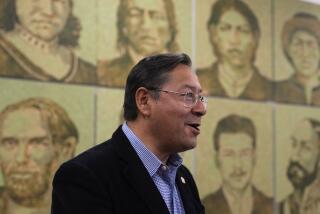Past catches up with Mexico City senator
- Share via
MEXICO CITY — The senator from Mexico City does not deny that he once was a revolutionary guerrilla, or that the name under which he was elected to office last year isn’t really his.
But he isn’t a member of a group that recently engaged in a series of bombings, he says.
Sen. Rene Arce Islas is one of the most powerful men in the leftist Democratic Revolution Party, or PRD, the largest opposition party in Congress. An Internet news report this week thrust the senator into an espionage thriller involving exploding pipelines, guerrilla romances and army spooks.
Reporte Indigo, an online magazine, said the senator’s name is not really Arce Islas, but rather Oscar Nahum Cirigo Vazquez. And the magazine said it had obtained a Mexican military intelligence report that alleges he is a leader of the Popular Revolutionary Army, or EPR.
The EPR took responsibility for blowing up Pemex oil and gas pipelines in central Mexico last month. In 2006, the EPR was said to have bombed a bank and the offices of Mexico’s election authorities. No one was injured in the attacks.
In an interview Monday, the senator denied being a member of the EPR, saying the intelligence report was leaked by military officials intent on ruining him.
The 53-year-old senator did not deny, however, that his current name is a pseudonym.
“Before 1974 I lived one life, and from 1975 forward I lived another,” he said Monday in an interview with this city’s W Radio. Of the EPR, he said, “I don’t agree with its methods or share its objectives.”
The leaking of intelligence reports and secretly recorded phone calls making unverifiable accusations are a common form of political warfare here, and the senator said he was being victimized by his opponents.
But when pressed by reporter Carmen Aristegui as to whether his name was really Oscar Nahum Cirigo Vazquez, he replied that he “could neither confirm nor deny” it. He said he was writing a book that would clear up the matter.
The controversy has been a reminder of the epic arc of this country’s recent history. Mexico has become a multiparty democracy in little more than a generation, and many current members of the “legal left” once embraced the concept of armed struggle.
“In my life I had to make decisions that radically changed the course of my life,” he told Aristegui.
The senator did confirm one point in the Reporte Indigo story: the revelation that he once was a member of the 23rd of September Communist League, an urban guerrilla group that attacked business and government targets in the 1970s.
In “1973 and 1974 I belonged to a group that fought for revolution . . . that took the path of violence to change the situation of the country,” he said. “That group disappeared decades ago. It has nothing to do with the EPR.”
In the 1970s, the Institutional Revolutionary Party ruled Mexico as a virtual one-party state. Army troops and intelligence officials waged a “dirty war” against radicals. Now Arce Islas is a member of a key Senate committee seeking to rewrite laws that govern military conduct.
The senator has proposed modifying the constitution and the penal code so members of the military can be tried in civil courts. “I am certain that this caused a reaction from the armed forces,” he said.
Arce Islas also is a leader of the PRD’s New Left faction, which is fighting unsuccessful presidential candidate Andres Manuel Lopez Obrador for control of the party. Reporte Indigo said that Arce Islas is the brother of another New Left leader, Victor Hugo Cirigo Vazquez, the president of Mexico City’s Legislative Assembly.
The report also said that military intelligence officers believe the senator has a sister in the EPR: Blanca Estela Cirigo Vazquez, alias Twinky Wonder.
Blanca Estela is said to be the girlfriend of EPR leader Constantino Canseco Ruiz.
No one has been arrested in the July attacks on the Pemex pipelines, which led to a week of fuel shortages and factory shutdowns in several central Mexican cities.
--
Cecilia Sánchez of The Times’ Mexico City Bureau contributed to this report.
More to Read
Sign up for Essential California
The most important California stories and recommendations in your inbox every morning.
You may occasionally receive promotional content from the Los Angeles Times.











